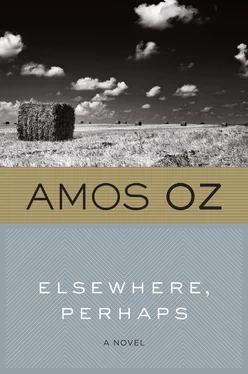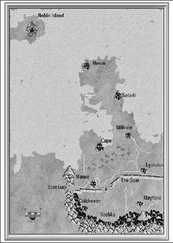"I used to think that once, too. Now I think there are more important things in the world than land."
Herbert raised his eyebrows and noted the words in his memory. The others were a little perplexed. Was it proper to start an argument at such a time? Actually, why not? He needed to be distracted. Reuven Harish replied:
"You're quite right, there are more important things than land. But without land they can't exist."
Rami interrupted abruptly to ask whether they had arranged for someone to sit up with his mother. She mustn't be left alone all night. He shivered. Herbert eyed him sternly through his steel-rimmed spectacles and said gravely:
"That's all right. Don't you worry about it."
Rami, having apparently forgotten his question, asked Reuven Harish how Noga was. Was she feeling O.K.? Reuven answered with a faint yes and lowered his eyes. Rami said that he admired Noga immensely for her decision. He considered that she was doing something exceptional.
Herbert made a mental note of this remark, too. The others, Reuven, Bronka, did not dare take issue with him.
Three or four younger members arrived, among them Tomer and Einav. The new arrivals were pale. They had been amazed to hear sounds of conversation coming from the room. Rami greeted them as if he were host.
"Come in. Sit down."
Herbert added:
"Come and sit down over here."
Einav said:
"Rami, I'm really so sorry."
Then, following a hint from Herbert Segal, the youngsters began to discuss the sowing of the winter crops. They said that the system of crop rotation was not planned as it should be. There was a dangerous disregard of the natural order of the crops. Bronka and Gerda went to the cooking alcove and made tea. Herbert whispered to them not to badger Rami or force him to drink. But Rami interrupted him and said to Bronka:
"No lemon for me, please. I hate lemon."
Herbert Segal was alert. He was full of a new sense of responsibility. He had been studying the boy for several hours. He had changed. Not because of his mother's death. The shock had not had time to register yet. That was not the source of the change. His whole attitude had altered. The lad went off to the army full of blazing ambition. Now I can see a different quality in him, a kind of contraction of the desires. Now one notices — what's the best way to put it? — a kind of sensitivity and attentiveness. One can see the signs of a responsible man. Of course, it's still in an unformed state, but giving him a sensible hand will go a long way to help. I used to think he was doomed to become a rigid, arrogant dolt. I was wrong. He's got the makings of a responsible man. Maybe Fruma was right when she used to repeat so obstinately that he was fond of animals and plants. Fruma was a perceptive woman. But you had to be perceptive yourself to realize how perceptive she was.
Herbert Segal's senses were alert. His new sense of responsibility coursed rhythmically through his veins. He looked kindly on Rami Rimon.
The next day we buried Fruma.
Rami Rominov, leaning on Herbert's arm, walked behind the coffin. At times it seemed as if Herbert was being supported by Rami, since Rami was so much taller than he. The whole kibbutz community followed them in silence, men, women, and youngsters. There were, we recall, three or four jet fighters circling over the valley throughout the funeral, shattering the silence. They soared, wheeled, and plunged. Their roaring provoked the air until it shrieked and howled like a living thing.
At the open grave side Herbert Segal spoke as follows:
"My friends, Fruma is no longer with us, and our hearts refuse to believe it. Perhaps I was somewhat closer to Fruma than the rest of us. But you all know as I do that her life was not an easy one. Not an easy one at all. Perhaps she could have made her life easier, but she was not the type to look for an easy life. She had to bear two successive blows of fate within a few years. First she lost Alter, and soon afterward she lost Yoash. And, I ask myself, who else could have withstood such blows as she did? Fruma, my friends, had great reserves of strength. She knew how to look fate straight in the eye. And that's not easy to do. Only strong people, very strong people, can look fate straight in its terrible eye and not be broken. Collapse, as we know, lies in wait for all of us. And our defenses are very frail. Fruma was a strong woman. She had something of that blazing determination that is the mark of heroes. No, Fruma was no hero. Not in the accepted sense of the word. She did not set her sights high. But there was something heroic in her self-control. In her determination to carry on. Her severity toward us, and her even greater severity toward herself. None of us will ever forget how she helped her husband during the difficult years. Fruma was endowed with a stubborn, uncompromising honesty. I remember, my friends, how once, at a meeting of the education committee, Fruma said with her customary piercing frankness that she rejected certain aspects of the collectivist ideology. And immediately she added very simply that as long as principles were principles we should follow them. No, my friends, there was nothing compromising in Fruma's nature."
Herbert paused for a while to allow the jets to whip angrily past and looked down into the open grave where the bare coffin lay. Suddenly, he took off his spectacles and revealed a delicate, innocent face that he had kept hidden from us for years. With his eyes closed and in a stifled tone of voice he continued:
"Fruma, our friend, you didn't know much happiness in your life. You suffered. You were always suffering. And we didn't always… we didn't always notice… what friends ought to… forgive us… we are only human. We shall miss you. I… do…"
The air was once more rent by a savage howl. The planes appeared, swooped, turned, and flew off. Herbert waited for them to vanish. When all was quiet again, he hesitated, his lips quivered; suddenly, he took two steps backward, hid his face behind his spectacles, and disappeared into his audience without finishing his address.
The earth thudded. Rami closed his eyes. A fly landed on his forehead. Rami did not brush it away but dropped his head onto Nina Goldring's shoulder, stamped childishly, and cried. (There was also a schoolboy there, by the name of Ido Zohar, who could not contain his tears, because he always responded to sadness. But his tears do not belong to our story.)
***
Two hours after the funeral Herbert Segal went to see Noga, to ask her whether she felt like coming to his room to keep Rami company. Noga asked him if he really thought that… that that was a good idea. Herbert said he had given the matter a good deal of thought. You ought to come and see him. He's asked about you twice.
Noga cast a sharp green look at Herbert Segal. Herbert did not look away, but his wise gray eyes stared steadily back. Simultaneously, the shadow of a smile touched both their eyes. Noga said:
"Why not? I'll come."
Herbert answered:
"I didn't doubt it for an instant. I was sure you would."
Rami Rimon was stretched out on Herbert Segal's bed. Someone had thrust a newspaper into his hand. It fascinated him strangely, as if every headline was meant for him alone. But the context was beyond his grasp. As soon as he saw Noga come in, he leaped up, leaned on the table, and stared at her body. He did not look up at her face. Noga followed his gaze and asked:
"Have I changed much?"
Rami said vaguely:
"You haven't come. It's Herbert. Herbert sent you. I know he did."
"Sit down, Rami. You're tired."
Rami obeyed her.
"Now stop looking at me like that. I don't like it."
"I… didn't mean to. Sorry, Noga. I'm sorry. I…"
"Hang on, I'll make some coffee. Let's have some coffee. I'm sure Herbert won't mind me using his things."
Читать дальше












